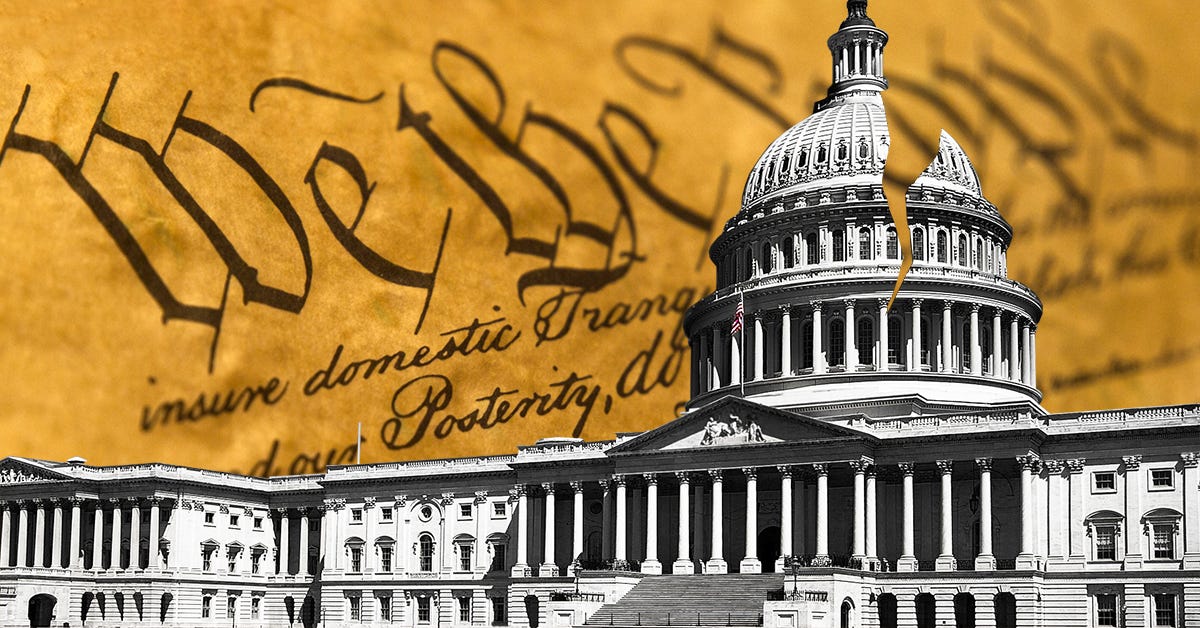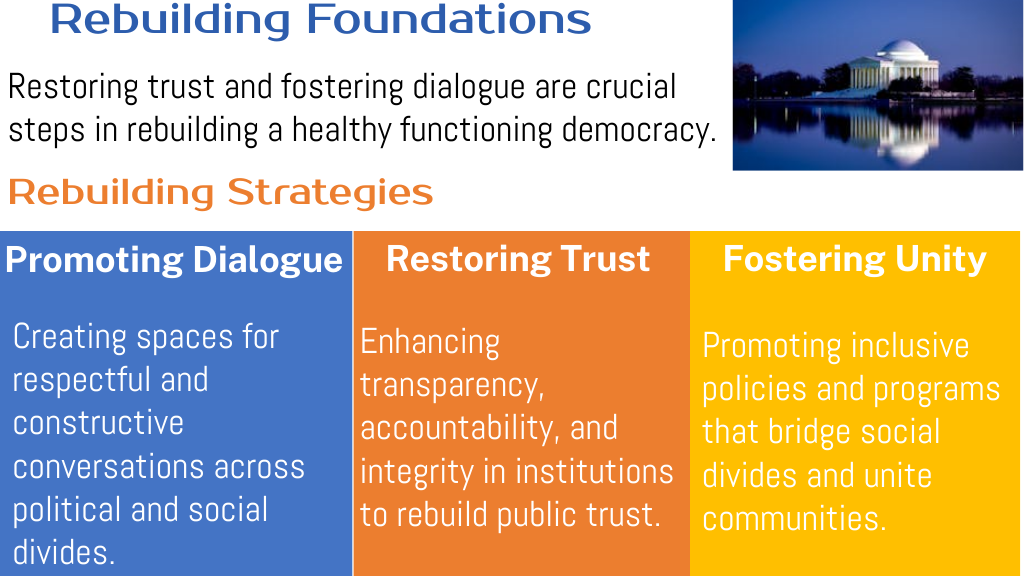Freedom in Freefall: How Ignorance Feeds Rising Fascism
Skills Inequality, Misinformation, and the Fragility of Democracy
Since the Great Depression and Franklin D. Roosevelt’s implementation of social safety nets, the United States has often held itself up as a model of democracy, progress, and opportunity.
Yet troubling trends have emerged in recent decades, suggesting an intellectual decline among U.S. adults—a decline that profoundly impacts democratic institutions, the rule of law, and freedom of expression.
These issues have only been exacerbated by the political polarization and authoritarian tendencies that have characterized the Trump era.
This article explores the consequences of declining intellectual abilities on the health of American democracy.
It examines the historical trajectory of these trends, from the post-World War II rise of social safety nets to the economic, educational, and cultural shifts that have eroded the cognitive and civic foundations of the American electorate.
The Trump era, with its sharp acceleration of misinformation, disinformation, and attacks on democratic institutions, serves as a focal point, illustrating the consequences of these declines in stark relief.
Paid subscribers receive access to weekly eBooks and monthly Audio/Video Books.
The Decline in Intellectual Abilities
As the United States navigates the complexities of the 21st century, one of its gravest challenges is the steady decline in adults’ intellectual abilities, as measured by literacy, numeracy, and digital problem-solving skills.
This section will analyze the Organisation for Economic Co-operation and Development’s (OECD’s) recent findings, discuss the broader implications of this decline, and explore digital literacy's role in shaping modern society.
The OECD’s Findings on Adult Skills
The United States faces a severe crisis in its adult population’s intellectual capacities. According to the 2023 OECD Survey of Adult Skills, the U.S. ranks among the countries with the largest skills inequalities.
Nearly 20% of American adults perform at or below the lowest proficiency levels in literacy and numeracy—key information-processing skills that form the foundation for critical thinking and civic engagement.
Skills Inequality and Its Broader Implications
A growing disparity in skills proficiency between high and low performers has created a dangerous divide.
Adults with lower intellectual abilities are less equipped to navigate complex political and social issues, leaving them vulnerable to manipulation by bad actors.
This growing inequality in intellectual abilities is not just an educational issue but a societal crisis, threatening the country's democratic foundations.
The Role of Digital Literacy in the Modern Age
The importance of digital literacy cannot be overstated in an era dominated by digital communication and information consumption,
The OECD report also highlights the struggles many American adults face in adapting to the rapid pace of technological change, leaving them unable to evaluate online information critically.
This vulnerability has been exploited by misinformation campaigns, further destabilizing democratic institutions.
Historical Context: The Roosevelt Era to Reaganomics
To fully understand the roots of intellectual decline and its impact on democracy, it is crucial to explore the historical context.
This section traces the trajectory from FDR’s creation of social safety nets and the golden age of public education to the Reagan era’s economic policies, which exacerbated inequality and contributed to the erosion of civic life.
The Birth of Social Safety Nets
FDR’s New Deal created a new vision of government responsibility for its citizens.
Programs like Social Security and unemployment insurance not only provided economic security but also relied on an informed citizenry capable of understanding and participating in democratic governance.
However, the era also revealed that economic stability alone could not ensure the intellectual robustness of a population.
The Erosion of Civic Education
The mid-20th century saw the golden age of public education, with schools emphasizing civic responsibility and critical thinking.
However, by the 1980s, neoliberal policies led to cuts in education funding, the privatization of public services, and the prioritization of standardized testing over critical thinking.
This shift marked the beginning of a steep decline in the intellectual foundation of many Americans.
The Reagan Era and the Rise of Economic Inequality
The Reagan era’s emphasis on “trickle-down economics” and deregulation exacerbated economic divides and reduced public investment in education.
The resulting economic inequality not only widened the skills gap but also contributed to a decline in civic participation as disenfranchised citizens became increasingly alienated from the political process.
The Trump Era: A Perfect Storm
The Trump presidency represents a watershed moment in the erosion of intellectual and democratic norms in the United States.
This section examines how misinformation, polarization, and the misuse of social media combined to create a perfect storm during this politically tumultuous era.
The Weaponization of Misinformation
The Trump presidency marked a turning point in the weaponization of misinformation. From “fake news” to conspiracy theories like QAnon, the administration capitalized on the intellectual decline of the electorate.
The OECD’s findings on digital illiteracy among American adults highlight how many could not discern fact from fiction in an era of rampant disinformation.
Polarization and the Erosion of Democratic Norms
Trump’s attacks on the rule of law, freedom of expression, and the peaceful transfer of power were not isolated events—they were enabled by years of intellectual decline and the rise of hyper-partisan media ecosystems.
Increasingly, Americans were siloed into information bubbles, with many lacking the skills necessary to critically evaluate the information they consumed.
The Role of Social Media and Algorithms
The role of social media in undermining democratic norms cannot be overstated. Social media platforms played a critical role in amplifying misinformation, exploiting cognitive biases, and creating echo chambers.
The OECD report underscores the struggles many adults face in navigating these complex digital environments, further undermining their ability to participate meaningfully in democracy.
The Consequences for Democracy
The decline in intellectual abilities is not just an educational issue but a direct threat to democracy itself. This section explores how diminishing cognitive skills have eroded trust in institutions, weakened the rule of law, and created fertile ground for authoritarian populism.
The Erosion of Trust
Trust in institutions is critical for democracy's functioning. Yet, as skills decline, so does trust.
According to the OECD, adults with higher literacy levels are likelier to engage in civic activities and trust others. Conversely, those with lower skills are more likely to feel disconnected and disempowered, creating fertile ground for authoritarian populism.
The Rule of Law Under Threat
The rule of law depends on citizens who understand and value democratic principles. During the Trump era, efforts to undermine the judiciary and overturn democratic elections were met with alarm by some but apathy—or even approval—by others.
This divergence reflects the dangers of declining intellectual abilities in maintaining the checks and balances of governance.
Freedom of Expression in Crisis
Freedom of expression is one of the cornerstones of democracy, but it is being eroded by the widespread decline in critical thinking skills and the proliferation of misinformation.
This section discusses how these trends are reshaping the landscape of free speech in America.
The Changing Landscape of Free Speech
Freedom of expression relies on the ability of citizens to engage in meaningful dialogue.
However, the decline in critical thinking skills has led to a coarsening of public discourse, where conspiracy theories and hate speech flourish while constructive debate dwindles.
The Role of Education and Media Literacy
Revitalizing education systems and promoting media literacy are critical to reversing these trends. Countries with stronger educational systems are more resilient to misinformation and can better uphold democratic norms.
Rebuilding Intellectual and Civic Foundations
If democracy is to survive and thrive, the United States must act decisively to address the intellectual decline of its adult population. This section outlines the steps needed to rebuild American society's intellectual and civic foundations.
Addressing the Skills Gap
The United States must prioritize adult education and lifelong learning. Investments in literacy, numeracy, and digital literacy are vital to rebuilding the electorate's intellectual foundation.
Strengthening Civic Education
Civic education must go beyond rote memorization to include critical thinking, media literacy, and understanding democratic principles. Schools must be empowered to prepare citizens for democracy's responsibilities
Policies for a Resilient Democracy
Policymakers must address economic inequality, regulate social media platforms, and promote transparency to rebuild trust in institutions. Only by addressing these systemic issues can the United States hope to preserve its democratic ideals.
Conclusion: A Call to Action
The decline in intellectual abilities among American adults is not just an educational crisis but a democratic one.
The Trump era exposed the fragility of the United States’ democratic institutions and underscored the urgent need for a more informed, engaged, and critical citizenry.
Rebuilding the nation's intellectual and civic foundations will require bold policy changes, educational investments, and a renewed commitment to truth and democratic principles.
The stakes could not be higher: the survival of democracy itself depends on it.
Enjoying the insights?
Help keep the content flowing—subscribe for free or become a paid supporter of independent journalism and receive exclusive weekly eBooks and monthly Audio/Video Books!









this is really interesting. As a recipient of the postwar boom in public education excellence, I was dismayed at the decline when my 2 sons attended public school in the 80s. At first, I thought it was just the school system in my area but 2000 miles away my sister encountered the same thing for her 2 sons. They researched and found a school system that was much better and moved there. I did not have the ability to do so. To this day I am angry I had to fight for every tiny thing for my sons so they could thrive. In fact, my oldest quit high school and 2 weeks later I called the school, and they didn't care. Thankfully they are both intelligent men and sought advanced education.
How do you feel about IQ testing? The general consensus is the average male IQ in this country is 100. I find that amazing. 1/2 of adult males test below 100. What do we do when the population doesn't even have the capacity to learn? Not just the lack of will and curiosity, but a lack of ability. I know an IQ is not the be all, end all of a person's worth. But when our current pres.elect felon tested at 73...I despair.